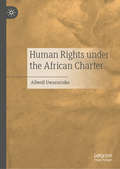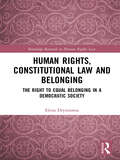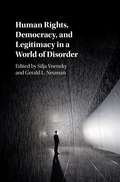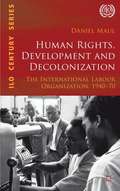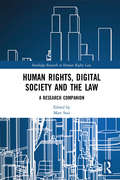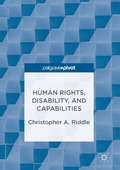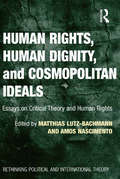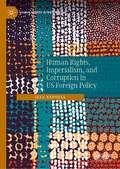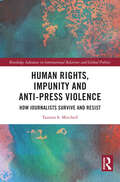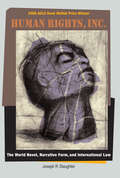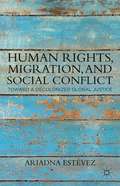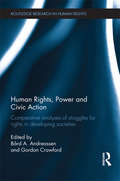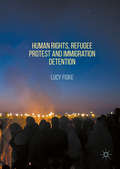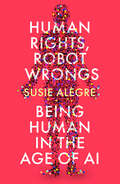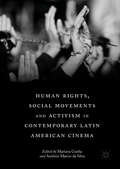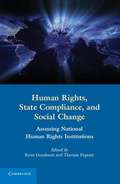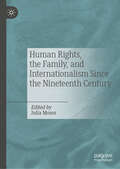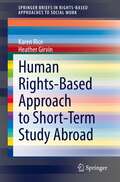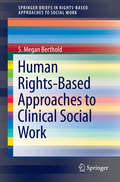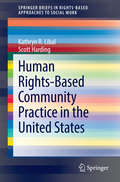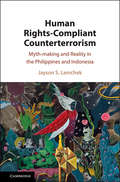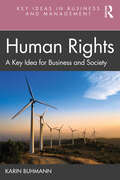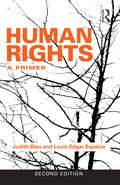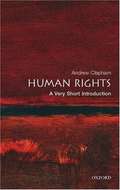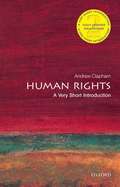- Table View
- List View
Human Rights under the African Charter
by Allwell UwazuruikeThis book critically examines the civil, political, socioeconomic, and group rights protected under the African Charter and its Protocol on women’s rights. It then examines the institutional protection of these rights through the African Commission and African Court. The book builds on the concept of regionalism within Africa and the recent drive for finding “African solutions to African problems” by tracing the development of human rights within Africa and assessing the effectiveness of Africa’s core regional human rights institutions. In turn, it critically analyses the obstacles to the full implementation of human rights in Africa such as the lack of political will, jurisdictional issues, lack of resources and funding, poverty, illiteracy, corruption, and customary practices that violate human rights. In closing, the book discusses possible solutions to these problems.
Human Rights, Constitutional Law and Belonging: The Right to Equal Belonging in a Democratic Society (Routledge Research in Human Rights Law)
by Elena DrymiotouWhile every constitution includes a provision over the right to equal protection of the laws, perhaps with different terminology, this book interprets this right in a new way. Theories of the right to equal protection of the laws as the right to anti-subordination are the most influential theories on the theory suggested by Drymiotou. Elena Drymiotou suggests understanding the right to equal protection of the laws in terms of belonging. She goes on to identify certain criteria and she offers a general theory of the Right to Democratic Belonging. This book uses political theory, constitutional provisions and case law to suggest this new theory of the right to equal protection of the laws; the theory of the Right to Equal Belonging in a Democratic Society or in other words, the Right to Democratic Belonging. Human Rights and Equal Belonging in a Democratic Society is the starting point of a more comprehensive theory of the right to democratic belonging. It will be of interest both to students at an advanced level, academics and reflective practitioners. It addresses the topics with regard to human rights and equality and will be of interest to researchers, academics, policymakers and students in the fields of human rights law, constitutional law and legal theory.
Human Rights, Democracy, and Legitimacy in a World of Disorder
by Gerald L. Neuman Silja VoenekyHuman Rights, Democracy, and Legitimacy in a World of Disorder brings together respected scholars from diverse disciplines to examine a trio of key concepts that help to stabilize states and the international order. While used pervasively by philosophers, legal scholars, and politicians, the precise content of these concepts is disputed, and they face new challenges in the conditions of disorder brought by the twenty-first century. This volume will explore the interrelationships and possible tensions between human rights, democracy, and legitimacy, from the philosophical, legal, and political perspectives; as well as the role of these concepts in addressing particular problems such as economic inequality, catastrophic risks posed by new technologies, access to health care, regional governance, and responses to mass migration. Made up of essays arising from an interdisciplinary symposium convened at Harvard Law School in 2016, this volume will examine how these trusted concepts may bring order to the global community.
Human Rights, Development and Decolonization
by Daniel MaulAn innovative diplomatic and intellectual history of decolonization, post-colonial nation building and international human rights and development discourses, this study of the role of the ILO during 1940-70 opens up new perspectives on the significance of international organisations as actors in the history of the 20th century.
Human Rights, Digital Society and the Law: A Research Companion (Routledge Research in Human Rights Law)
by Mart SusiThe Internet has created a formidable challenge for human rights law and practice worldwide. International scholarly and policy-oriented communities have so far established a consensus regarding only one main aspect – human rights in the internet are the same as offline. There are emerging and ongoing debates regarding not only the standards and methods to be used for achieving the "sameness" of rights online, but also whether "classical" human rights as we know them are contested by the online environment. The internet itself, in view of its cross-border nature and its ability to affect various areas of law, requires adopting an internationally oriented approach and a perspective strongly focused on social sciences. In particular, the rise of the internet, enhanced also by the influence of new technologies such as algorithms and intelligent artificial systems, has influenced individuals’ civil, political and social rights not only in the digital world, but also in the atomic realm. As the coming of the internet calls into question well-established legal categories, a broader perspective than the domestic one is necessary to investigate this phenomenon. This book explores the main fundamental issues and practical dimensions related to the safeguarding of human rights in the internet, which are at the focus of current academic debates. It provides a comprehensive analysis with a forward-looking perspective of bringing order into the somewhat chaotic online dimension of human rights. It addresses the matter of private digital censorship, the apparent inefficiency of existing judicial systems to react to human rights violations online, the uncertainty of liability for online human rights violations, whether the concern with personal data protection overshadows multiple other human rights issues online and will be of value to those interested in human rights law and legal regulation of the internet.
Human Rights, Disability, and Capabilities
by Christopher A. RiddleThis book presents the argument that health has special moral importance because of the disadvantage one suffers when subjected to impairment or disabling barriers. Christopher A. Riddle asserts that ill health and the presence of disabling barriers are human rights issues and that we require a foundational conception of justice in order to promote the rights of people with disabilities. The claim that disability is a human rights issue is defended on the grounds that people with disabilities experience violations to their dignity, equality, and autonomy. Because human rights exist as a subset of other justice-based rights, Riddle contends that we must support a foundation of justice compatible with endorsing these three principles (equality, dignity, and autonomy). This volume argues that the "capabilities approach" is the best currency of justice for removing the disabling barriers that consistently violate approximately one billion people's human rights.
Human Rights, Human Dignity, and Cosmopolitan Ideals: Essays on Critical Theory and Human Rights (Rethinking Political and International Theory)
by Amos Nascimento Matthias Lutz-BachmannThis book makes a significant contribution to the on-going international dialogue on the meaning of concepts such as human rights, humanity, and cosmopolitanism. The authors propose a new agenda for research into a Critical Theory of Human Rights. Each chapter pursues three goals: to reconstruct modern philosophical theories that have contributed to our views on human rights; to highlight the importance of humanity and human dignity as a complementary dimension to liberal rights; and, finally, to integrate these issues more directly in contemporary discussions about cosmopolitanism. The authors not only present multicultural perspectives on how to rethink political and international theory in terms of the normativity of human rights, but also promote an international dialogue on the prospects for a critical theory of human rights discourses in the 21st century.
Human Rights, Imperialism, and Corruption in US Foreign Policy (Human Rights Interventions)
by Ilia XypoliaThis book provides a novel account of the role of human rights discourse in the US foreign policy. The book analyses the US State Department’s Annual Country Reports on Human Rights Practices as a means to monopolise and, more importantly, legitimise a specific framing of the human rights agenda to further US foreign policy. The US agenda’s deviation from established international human rights standards has very serious implications considering the preponderant global influence exercised by the US. Furthermore, more recently, the reports have added a separate section on "corruption" as a human rights issue. “Corruption”, a controversial concept from the outset, is understood in a narrow way as a public sector issue that largely prevails in and subverts the so-called developing and transition countries. This book shows how this recent inclusion ultimately serves the US global neoliberal imperialist agenda and becomes the hegemonic discourse in international organisations.
Human Rights, Impunity and Anti-Press Violence: How Journalists Survive and Resist (Routledge Advances in International Relations and Global Politics)
by Tamsin S. MitchellHuman Rights, Impunity and Anti-Press Violence is a qualitative, comparative and interdisciplinary exploration of journalists’ responses to impunity for anti-press violence in two Latin American partial democracies, Mexico and Honduras. It is the first book-length analysis of the security and protection of journalists who can also be seen as human rights defenders. The book draws on 89 interviews with such journalist-defenders and organisations that support them, carried out in 2018 and 2022/23. It shows how journalists use several interlinked strategies to seek justice and protection: domestic and international strategies (“protection approaches,” or making rights demands of the state, often via intermediaries), and activist and professional strategies (“self-protection approaches”).Critical of international relations scholarly debates on the value of international human rights law/norms to local civil society, Tamsin Mitchell demonstrates that while protection approaches based on such standards are important and valued, they are not enough: self-protection is central – and increasingly so. She advocates the need to take a more bottom-up and inclusive approach to civil society and the importance of alternative, non-legal norms in (self-)protection and truth- and justice-seeking.Suitable for both academics and practitioners, Human Rights, Impunity and Anti-Press Violence prescribes new areas of research and debate in international relations, global studies, human rights and media/journalism studies.
Human Rights, Inc.: The World Novel, Narrative Form, and International Law
by Joseph R. SlaughterIn this timely study of the historical, ideological, and formal interdependencies of the novel and human rights, Joseph Slaughter demonstrates that the twentieth-century rise of “world literature” and international human rights law are related phenomena. Slaughter argues that international law shares with the modern novel a particular conception of the human individual. The Bildungsroman, the novel of coming of age, fills out this image, offering a conceptual vocabulary, a humanist social vision, and a narrative grammar for what the Universal Declaration of Human Rights and early literary theorists both call “the free and full development of the human personality.”Revising our received understanding of the relationship between law and literature, Slaughter suggests that this narrative form has acted as a cultural surrogate for the weak executive authority of international law, naturalizing the assumptions and conditions that make human rights appear commonsensical. As a kind of novelistic correlative to human rights law, the Bildungsroman has thus been doing some of the sociocultural work of enforcement that the law cannot do for itself. This analysis of the cultural work of law and of the social work of literature challenges traditional Eurocentric histories of both international law and the dissemination of the novel. Taking his point of departure in Goethe’s Wilhelm Meister, Slaughter focuses on recent postcolonial versions of the coming-of-age story to show how the promise of human rights becomes legible in narrative and how the novel and the law are complicit in contemporary projects of globalization: in colonialism, neoimperalism, humanitarianism, and the spread of multinational consumer capitalism.Slaughter raises important practical and ethical questions that we must confront in advocating for human rights and reading world literature—imperatives that, today more than ever, are intertwined.
Human Rights, Migration, and Social Conflict: Towards a Decolonized Global Justice
by Ariadna EstévezThis book uses human rights as part of a constructivist methodology designed to establish a causal relationship between human rights violations and different types of social and political conflict in Europe and North America.
Human Rights, Power and Civic Action: Comparative analyses of struggles for rights in developing societies (Routledge Research in Human Rights)
by Gordon Crawford Bård A. AndreassenHuman Rights, Power and Civic Action examines the interrelationship between struggles for human rights and the dynamics of power, focusing on situations of poverty and oppression in developing countries. It is argued that the concept of power is a relatively neglected one in the study of rights-based approaches to development, especially the ways in which structures and relations of power can limit human rights advocacy. Therefore this book focuses on how local and national struggles for rights have been constrained by power relations and structural inequalities, as well as the extent to which civic action has been able to challenge, alter or transform such power structures, and simultaneously to enhance protection of people’s basic human rights. Contributors examine and compare struggles to advance human rights by non-governmental actors in Cambodia, China, Ghana, Kenya, South Africa and Zimbabwe. The country case-studies analyse structures of power responsible for the negation and denial of human rights, as well as how rights-promoting organisations challenge such structures. Utilising a comparative approach, the book provides empirically grounded studies leading to new theoretical understanding of the interrelationships between human rights struggles, power and poverty reduction. Human Rights, Power and Civic Action will be of interest to students and scholars of human rights politics, power, development, and governance.
Human Rights, Refugee Protest and Immigration Detention
by Lucy FiskeThis bookbuilds a compelling picture of injustices inside immigration detention centers,within the context of the rise of the use of immigration detention in the GlobalNorth. The author presents the rarely heard voices of refugees, bringing theirperspectives to light and personalising and humanising a global politicalissue. Based onin-depth interviews with formerly detained refugees who were involved in a widerange of protests, such as sit-ins and non-compliance, hunger strikes, lipsewing, escapes and riots, Human Rights, Refugee Protest and ImmigrationDetention presents a comprehensive insight into immigrationdetention and protest. Drawingon the work of Michel Foucault and Hannah Arendt, the book challengescontemporary human rights discourses which institutionalise power and will be amust-read for scholars, advocates and policymakers engaged in debates aboutimmigration detention and forced migration.
Human Rights, Robot Wrongs: A Manifesto for Humanity in the Age of AI
by Susie AlegreA highly topical manifesto about what it means to be human in the age of AI by a leading barrister. No longer an uncertain technology of the distant future, artificial intelligence is starting to shape every aspect of our daily lives, from how we think to who we love. In this urgent polemic, leading barrister Susie Alegre explores the ways in which artificial intelligence threatens our fundamental human rights - including the rights to life, liberty and fair trial; the right to private and family life; and the right to free expression - and how we protect those rights. Touching on the many profound ethical dilemmas posed by emerging technologies, and full of fascinating case studies, Human Rights, Robot Wrongs is a rallying cry for humanity in the age of AI.
Human Rights, Social Movements and Activism in Contemporary Latin American Cinema
by Antônio Márcio da Silva Mariana CunhaThis edited collection explores how contemporary Latin American cinema has dealt with and represented issues of human rights, moving beyond many of the recurring topics for Latin American films. Through diverse interdisciplinary theoretical and methodological approaches, and analyses of different audiovisual media from fictional and documentary films to digitally-distributed activist films, the contributions discuss the theme of human rights in cinema in connection to various topics and concepts. Chapters in the volume explore the prison system, state violence, the Mexican dirty war, the Chilean dictatorship, debt, transnational finance, indigenous rights, social movement, urban occupation, the right to housing, intersectionality, LGBTT and women’s rights in the context of a number of Latin American countries. By so doing, it assesses the long overdue relation between cinema and human rights in the region, thus opening new avenues to aid the understanding of cinema’s role in social transformation.
Human Rights, State Compliance, and Social Change
by Thomas Pegram Ryan GoodmanNational Human Rights Institutions (NHRIs) - human rights commissions and ombudsmen - have gained recognition as a possible missing link in the transmission and implementation of international human rights norms at the domestic level. They are also increasingly accepted as important participants in global and regional forums where international norms are produced. By collecting innovative work from experts spanning international law, political science, sociology and human rights practice, this book critically examines the significance of this relatively new class of organizations. It focuses, in particular, on the prospects of these institutions to effectuate state compliance and social change. Consideration is given to the role of NHRIs in delegitimizing - though sometimes legitimizing - governments' poor human rights records and in mobilizing - though sometimes demobilizing - civil society actors. The volume underscores the broader implications of such cross-cutting research for scholarship and practice in the fields of human rights and global affairs in general.
Human Rights, the Family, and Internationalism Since the Nineteenth Century
by Julia MosesThis book examines one of the key issues shaping global considerations of human rights today: the idea of the family as a protected category. Bringing together historians, political scientists, legal scholars, and historical sociologists, the book investigates how ideas about the family and sexuality intersected with thinking about human rights, for example, through new international law and international institutions; social movements targeting issues related to religion, gender, and sexuality; historical developments such as war and the collapse of empires; and, developments in the social sciences. It features case studies on regions around the globe, as well as on relevant international organisations and individuals who have been influential in this area. In doing so, the contributors to this collection interrogate the relationship between human rights related to the family, and broader debates about rights related to gender and sexuality.
Human Rights-Based Approach to Short-Term Study Abroad (SpringerBriefs in Rights-Based Approaches to Social Work)
by Karen Rice Heather GirvinShort-term study abroad experiences are on the rise across social work programs. This increase is fueled by the Educational Policy and Accreditation Standards of the Council on Social Work Education (CSWE) that social work programs graduate students who are ready to engage diversity and function ethically as global citizens who understand mechanisms of oppression. With the increasing number of short-term study abroad trips, this brief offers a framework that provides strategies for empowering the populations and communities in which these trips occur. Developing short-term study abroad trips from a human rights-based framework rather than a needs-based approach is urgent and necessary, as the community in which the visit will occur is placed at the center of planning efforts and its members become equal and active participants. The brief is accessible and relevant to both instructors and students, with thoughtful emphasis placed in each chapter to align with the needs of each group more distinctly. It is conceived with both travel-based (field education) and classroom learning (pre-trip preparation) in mind. Though developed with more depth, theory, and evidence than a "how-to manual," the brief serves as an exemplary "guide" that prepares those engaging in short-term study abroad trips with information and strategies that are derived from the key concepts of a rights-based approach to field education. Human Rights-Based Approach to Short-Term Study Abroad is essential reading that engages students and faculty with case examples to illuminate the complex concepts that are taught by faculty as well as specific exercises and assignments to guide both faculty and student through the process of developing and implementing short-term study abroad trips. This brief is of immediate relevance for undergraduate and graduate coursework in field education, international social work, human rights, global social work, and macro social work, as well as useful for any practitioner seeking CSWE accreditation.
Human Rights-Based Approaches to Clinical Social Work
by S. Megan BertholdThis groundbreaking Brief brings a rights-based perspective to social work as opposed to the charity- and needs-based formats traditional to the field. Core principles for effective practice are discussed in the context of global human rights advocacy, from addressing individuals' immediate issues to challenging the structures that allow continued injustices to marginalized populations. Focusing specifically on interventions with survivors (and some perpetrators) of torture, human trafficking, and domestic violence, coverage explores and explodes myths about these issues--some of which survivors themselves may believe--and illustrates the immediate application and long-term benefits of rights-based therapy. Case examples, discussion questions, resource links, and a clinician self-care section reinforce the salience of this approach, modeling practice that is ethical in its outlook and empowering in its healing. Clinician skills emphasized in Human Rights-Based Approaches to Clinical Social Work: Reframing client needs as human rights. Cultural humility versus cultural competence. Building the therapeutic relationship and reconstructing safety. Developing trauma-informed practice and avoiding re-traumatization. Forensic and activist roles for social workers. Burnout prevention for practitioners.
Human Rights-Based Community Practice in the United States
by Kathryn R. Libal Scott HardingA transformative model for community social work rooted in basic social and economic rights is the basis of this timely Brief. With specific chapters spotlighting the rights to health care, nutritious food, and adequate and affordable housing, the book describes in depth the role of community practice in securing rights for underserved and vulnerable groups and models key aspects of rights-based work such as empowerment, participation, and collaboration. Case examples relate local struggles to larger regional and statewide campaigns, illustrating ways the book's framework can inform policymakers and improve social structures in the larger community. This rights-based perspective contrasts sharply with the deficits-based approach commonly employed in community social work, and has the potential to inspire new strategies for addressing systemic social inequality. Features of Human Rights-Based Community Practice in the United States: A conceptual basis for a rights-based approach to community practice. Detailed analysis of legal and social barriers to health care, housing, and food. Examples of effective and emerging rights-based community interventions. Methods for assessing the state of human rights at the community level. Documents, discussion questions, resource lists, and other valuable tools.
Human Rights-Compliant Counterterrorism: Myth-making and Reality in the Philippines and Indonesia
by Jayson S. LamchekSince 9/11, we have lived in an age of counterterrorism in which the spectre of terrorism justifies increasingly repressive and violent measures. Against this backdrop, legal scholars and human rights advocates have encouraged integration of human rights into the discourse of counterterrorism as the best way to counter such repression and violence. This book challenges that received wisdom by showing the ambiguous effects of such converged discourse on developing countries. It highlights the effect of terrorism discourse on human rights in two developing countries, viz., the Philippines and Indonesia, the efforts of local advocates in resisting abuses in the name of counterterrorism, and the persistence of violations despite legal and policy reforms in those countries. Applying a novel analytic framework drawn from critical terrorism studies and critical international law, the book provokes new thinking on the future of human rights advocacy in the age of counterterrorism.
Human Rights: A Key Idea for Business and Society (Key Ideas in Business and Management)
by Karin BuhmannHuman rights is an interdisciplinary subject as well as a foundational aspect of the law. The importance of human rights at the intersection of business and society is central, yet under-analyzed. This book provides an accessible understanding of what human rights are, how business enterprises may impact human rights for better or for worse, and how such impacts can or should be managed. Human Rights: A Key Idea for Business and Society equips readers interested in the relationship between business and society with the foundational knowledge for engaging in debates and operational tasks related to the roles and responsibilities of business with regard to human rights. It covers human rights aspects relevant to common management tasks, including supply chain management, human resource management, risk management, non-financial reporting, finance, and stakeholder engagement. It covers opportunities and challenges related to the Sustainable Development Goals (SDGs) and climate change mitigation. The book explains the foundations for human rights, social expectations, and legal requirements on businesses to respect human rights and how business enterprises should identify and manage their human rights impacts. A concise introduction to a complex topic, this book is perfect reading for students of corporate social responsibility, business ethics, and international business, as well as an illuminating guide for researchers, managers, civil society organizations, government officials, and reflective practitioners.
Human Rights: A Primer
by Judith Blau Louis Edgar EsparzaHuman Rights: A Primer breaks new ground in clarifying for undergraduates the international significance of human rights. This new edition highlights current and recent developments, using themes familiar to undergraduates. For example, Americans are increasingly aware of the growing disparities in economic well-being. It is indeed a crisis that is global and national. Because this book focuses on globalization and human rights as intertwined, readers will gain a comprehensive understanding of the role of neoliberal capitalism in undermining human rights (dignity, security, and well-being). Major works by Thomas Piketty and Joseph Stiglitz are discussed, along with recent upheavals in Greece, and the rising tide of refugees in Europe and North America. Furthermore, powerful forces that will increasingly test global solidarity and the future of the planet relate to the extent that countries and peoples cooperate in combating global warming and promoting sustainable development goals (SDGs). Key dates for both these issues occurred in the second half of 2015 – the UN Sustainable Development Summit in September and the Paris Climate Conference (COP21) in December. The significance of both conferences for human rights is discussed in this new edition.
Human Rights: A Very Short Introduction
by Andrew ClaphamFrom the controversial incarceration of prisoners at Guantanamo Bay, to the brutal ethnic cleansing being practiced in Darfur, to the widespread denial of equal rights to women in many areas of the world, human rights violations are a constant presence in the news and in our lives. Taking an international perspective, and focusing on highly topical issues such as torture, arbitrary detention, privacy, health, and discrimination, this Very Short Introduction will help readers to understand for themselves the controversies and complexities behind this vitally relevant issue. Looking at the philosophical justification for rights, the historical origins of human rights and how they are formed in law, Andrew Clapham explains what our human rights actually are, what they might be, and where the human rights movement is heading.
Human Rights: A Very Short Introduction (Second Edition) (Very Short Introductions)
by Andrew Clapham<p>Today it is usually not long before a problem gets expressed as a human rights issue. Indeed, human rights law continues to gain increasing attention internationally, and must move quickly in order to keep up with a social world that changes so rapidly. <p>This Very Short Introduction, in its second edition, brings the issue of human rights up to date, considering the current controversies surrounding the movement. Discussing torture and arbitrary detention in the context of counter terrorism, Andrew Clapham also considers new challenges to human rights in the context of privacy, equality and the right to health. Looking at the philosophical justification for rights, the historical origins of human rights and how they are formed in law, Clapham explains what our human rights actually are, what they might be, and where the human rights movement is heading.</p>
